Watching a German Shepherd puppy grow is an incredible journey, filled with rapid changes and delightful milestones. At 6 months old, your German Shepherd is no longer a tiny pup but a rapidly developing adolescent, bridging the gap between playful puppyhood and maturing adulthood. This period is a crucial time for physical development, behavioral shaping, and solidifying the bond between you and your canine companion. For many owners, it’s also a time of wonder, comparing their own growing pup to images of 8 week old german shepherd puppies and seeing how far they’ve come.
In this comprehensive guide, we’ll delve into what you can expect from your German Shepherd at 6 months, covering their physical growth, behavioral traits, and essential care tips. We’ll also share a collection of captivating German Shepherd 6 Months Old Pictures that beautifully illustrate their remarkable transformation from a fluffy baby to a majestic young dog.
The Rapid Growth of a German Shepherd Puppy
German Shepherds are known for their impressive size and powerful physique, and much of this development happens within their first year. By 6 months, your German Shepherd puppy will have undergone significant growth spurts, often looking quite lanky as their bones lengthen before their muscles fill out.
Physically, a 6-month-old German Shepherd will typically weigh between 45 to 60 pounds for males and 40 to 50 pounds for females. Their height can range from 20 to 23 inches at the shoulder. However, these are general guidelines, and individual dogs can vary based on genetics, nutrition, and overall health. Owners often marvel at how quickly their pups grow from the size of german shepherd puppies pictures 3 months old to a substantially larger, more active dog. Their ears, which might have flopped adorably for months, are likely to be standing tall and proud by now, a hallmark of the breed’s distinct look. Their puppy coat is also transitioning, becoming denser and more adult-like.
German Shepherd Development at 6 Months: More Than Just Size
Beyond their physical growth, 6 months marks a critical stage in a German Shepherd’s behavioral and mental development. This is often referred to as adolescence, a time when your pup might test boundaries, exhibit increased energy, and require consistent training and socialization.
Behavioral Changes and Training
Adolescence in German Shepherds can sometimes feel like a regression in training. Your pup might suddenly ‘forget’ commands they once knew or become more easily distracted. This isn’t defiance; it’s a normal part of their development as they gain more independence and explore their environment with newfound confidence. Consistent, positive reinforcement training is paramount during this stage. Focus on reinforcing basic commands, working on leash manners, and introducing new, engaging challenges to keep their minds stimulated. Continue with socialization, exposing them to various sights, sounds, people, and other well-behaved dogs to prevent fear or aggression issues later on. Remember, a well-socialized 6-month-old German Shepherd puppy is often more adaptable and confident.
Nutritional and Exercise Needs
With their rapid growth and high energy levels, 6-month-old German Shepherds have substantial nutritional requirements. It’s crucial to feed them a high-quality large-breed puppy formula that supports their bone and joint development. Overfeeding or providing adult dog food too early can lead to developmental problems. Consult your vet for precise feeding guidelines tailored to your pup’s individual needs.
Exercise is equally vital. German Shepherds are an active breed, and a 6-month-old needs plenty of physical activity to burn off energy and build muscle. Aim for a combination of structured exercise, such as leash walks and playtime in a secure yard, and mental stimulation through training sessions and puzzle toys. Avoid excessive high-impact activities like long-distance running or intense jumping, as their growth plates are still developing and prone to injury. Many owners love seeing the distinct patterns and coats of their pictures of short haired german shepherds as they run and play.
Health Considerations
At 6 months, your German Shepherd should have completed their core vaccination series. Regular veterinary check-ups are essential to monitor their growth, discuss diet, and address any potential health concerns. German Shepherds are prone to certain genetic conditions, such as hip and elbow dysplasia, so maintaining a healthy weight and avoiding strenuous activity that stresses joints is important. Discuss preventative care and any breed-specific concerns with your veterinarian.
A Gallery of 6-Month-Old German Shepherd Pictures
There’s nothing quite like seeing the progression of a German Shepherd puppy firsthand. These images showcase the remarkable transformation, often highlighting their distinctive markings and charming personalities as they grow. Whether you’re interested in the majestic appearance of king german shepherd puppies for sale or the striking contrast of black and white german shepherd puppy as they mature, these before-and-after photos offer a wonderful glimpse into their journey.
Here are some beautiful german shepherd 6 months old pictures showing how much these pups change in just a few months:
2.5 months vs 6 months
 Sable German Shepherd puppy at 2.5 months and 6 months showing significant growth
Sable German Shepherd puppy at 2.5 months and 6 months showing significant growth9 weeks vs 17 weeks
 German Shepherd puppy in two stages: 9 weeks and 17 weeks, highlighting early development
German Shepherd puppy in two stages: 9 weeks and 17 weeks, highlighting early development8 weeks vs 16 weeks
 Playful German Shepherd puppy at 8 weeks compared to its growth at 16 weeks
Playful German Shepherd puppy at 8 weeks compared to its growth at 16 weeks8 weeks vs 1 year
 German Shepherd puppy at 8 weeks transforming into an adult at 1 year old
German Shepherd puppy at 8 weeks transforming into an adult at 1 year old9 weeks vs 22 weeks
 Young German Shepherd puppy at 9 weeks side-by-side with its 22-week-old self
Young German Shepherd puppy at 9 weeks side-by-side with its 22-week-old self10 weeks vs 6 months
 Stunning German Shepherd puppy at 10 weeks growing into a beautiful 6-month-old
Stunning German Shepherd puppy at 10 weeks growing into a beautiful 6-month-old10 weeks vs 23 weeks
 Dillinger the sable German Shepherd puppy at 10 weeks and 23 weeks, showcasing growth
Dillinger the sable German Shepherd puppy at 10 weeks and 23 weeks, showcasing growth12 weeks vs 22 weeks
 Comparison of a German Shepherd puppy at 12 weeks and 22 weeks old
Comparison of a German Shepherd puppy at 12 weeks and 22 weeks oldA few weeks vs 6 months
 Monty the German Shepherd from a tiny pup to a playful 6-month-old
Monty the German Shepherd from a tiny pup to a playful 6-month-old3 months vs 6 months
 Bruce the German Shepherd puppy at 3 months and his development at 6 months
Bruce the German Shepherd puppy at 3 months and his development at 6 months16 weeks vs 6 months
 Adorable German Shepherd puppy Groot at 16 weeks versus his 6-month-old appearance
Adorable German Shepherd puppy Groot at 16 weeks versus his 6-month-old appearance3 months vs 9 months
 German Shepherd puppy Mookie Pookie at 3 months and the significant change at 9 months
German Shepherd puppy Mookie Pookie at 3 months and the significant change at 9 months3 months vs 6 months
 Freddie the German Shepherd puppy showing a classic head tilt at 3 months and 6 months
Freddie the German Shepherd puppy showing a classic head tilt at 3 months and 6 months4 months vs 6 months
 Rapid growth of a German Shepherd from 4 months to 6 months old
Rapid growth of a German Shepherd from 4 months to 6 months old9 weeks vs 7 months
 Riggs the German Shepherd puppy at 9 weeks versus his majestic look at 7 months
Riggs the German Shepherd puppy at 9 weeks versus his majestic look at 7 months6 weeks vs 1 year
 Jesse the German Shepherd puppy at 6 weeks and fully grown at 1 year old
Jesse the German Shepherd puppy at 6 weeks and fully grown at 1 year old6 weeks vs 1 year
 Adorable German Shepherd puppy at 6 weeks compared to the powerful adult at 1 year
Adorable German Shepherd puppy at 6 weeks compared to the powerful adult at 1 year11 weeks vs 20 weeks
 Bear the German Shepherd puppy at 11 weeks and his progression at 20 weeks
Bear the German Shepherd puppy at 11 weeks and his progression at 20 weeks7 weeks vs 16 weeks
 Whiskey the German Shepherd puppy from 7 weeks to 16 weeks old
Whiskey the German Shepherd puppy from 7 weeks to 16 weeks old
Key Considerations for Your 6-Month-Old German Shepherd
As your German Shepherd enters adolescence, continuing to provide a structured and nurturing environment is vital. This period sets the foundation for their adult behavior and overall well-being.
- Consistent Training: Keep training sessions short, fun, and frequent. This reinforces good habits and provides mental stimulation. Consider enrolling in advanced obedience classes or exploring canine sports like agility to channel their energy.
- Continued Socialization: Even if your pup was well-socialized as a younger puppy, continue positive exposures to new experiences. A 6-month-old GSD can be more wary, so gentle and controlled introductions are key.
- Veterinary Care: Ensure all vaccinations are up to date and discuss spaying or neutering options with your vet. Regular check-ups help monitor their health and catch potential issues early.
- Nutrition and Weight Management: Monitor their weight closely to prevent obesity, which can exacerbate joint problems. Adjust food portions as needed based on their activity level and growth.
- Mental and Physical Stimulation: German Shepherds thrive on having a “job.” Provide plenty of interactive toys, daily walks, and opportunities for safe, supervised play. A bored German Shepherd can develop destructive behaviors.
Conclusion
The 6-month mark in a German Shepherd’s life is a fascinating and dynamic period. They are transitioning from the boundless energy of puppyhood into the more independent and physically impressive stage of adolescence. Understanding these changes, providing appropriate care, and maintaining consistent training are crucial for raising a well-adjusted and happy German Shepherd.
The german shepherd 6 months old pictures shared here beautifully capture this transformation, reminding us how quickly our beloved companions grow. By being a patient, knowledgeable, and loving owner, you can ensure your German Shepherd navigates this stage successfully and continues to develop into the magnificent dog they are meant to be. For more insights into raising a German Shepherd, explore our other articles on Dog Care Story.

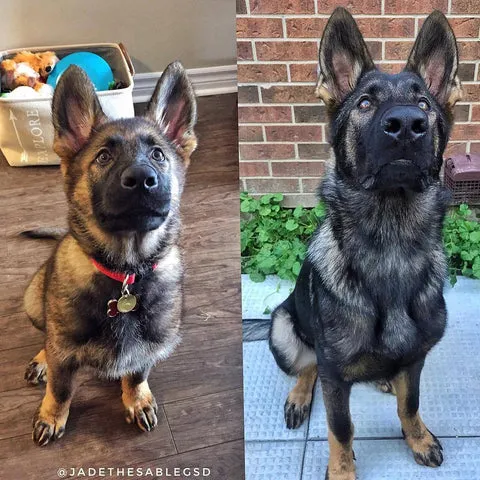
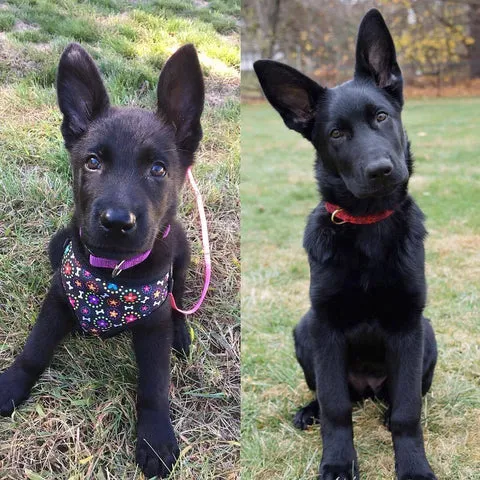 German Shepherd puppy in two stages: 9 weeks and 17 weeks, highlighting early development
German Shepherd puppy in two stages: 9 weeks and 17 weeks, highlighting early development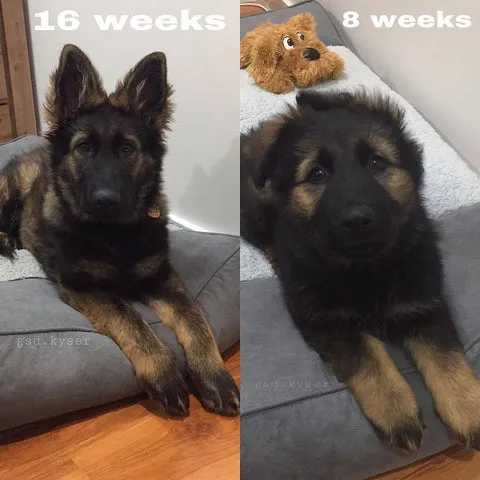 Playful German Shepherd puppy at 8 weeks compared to its growth at 16 weeks
Playful German Shepherd puppy at 8 weeks compared to its growth at 16 weeks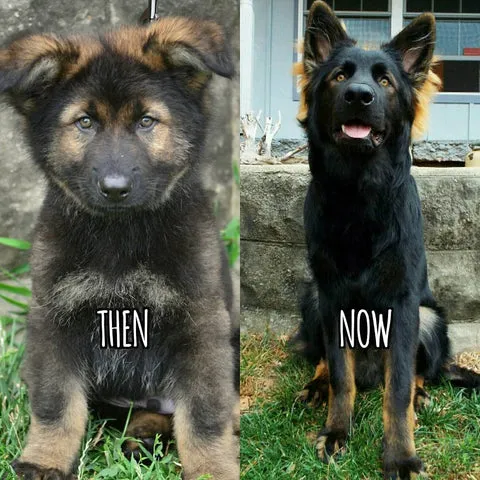 German Shepherd puppy at 8 weeks transforming into an adult at 1 year old
German Shepherd puppy at 8 weeks transforming into an adult at 1 year old Young German Shepherd puppy at 9 weeks side-by-side with its 22-week-old self
Young German Shepherd puppy at 9 weeks side-by-side with its 22-week-old self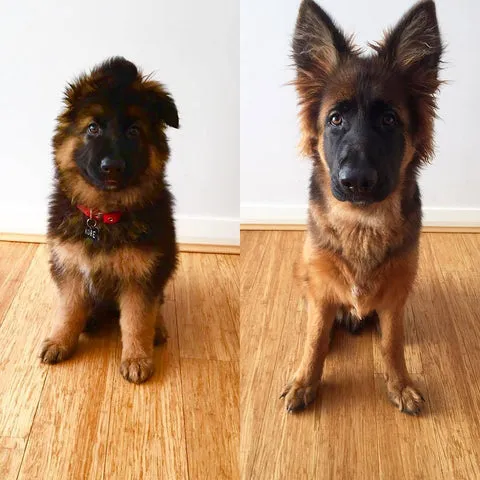 Stunning German Shepherd puppy at 10 weeks growing into a beautiful 6-month-old
Stunning German Shepherd puppy at 10 weeks growing into a beautiful 6-month-old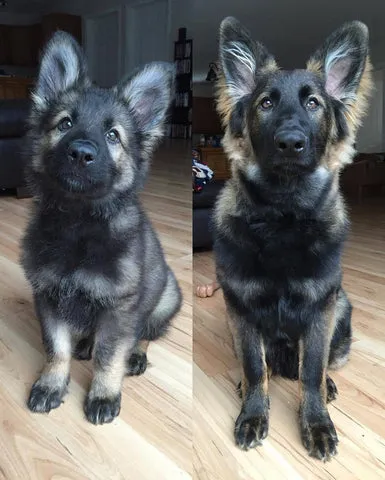 Dillinger the sable German Shepherd puppy at 10 weeks and 23 weeks, showcasing growth
Dillinger the sable German Shepherd puppy at 10 weeks and 23 weeks, showcasing growth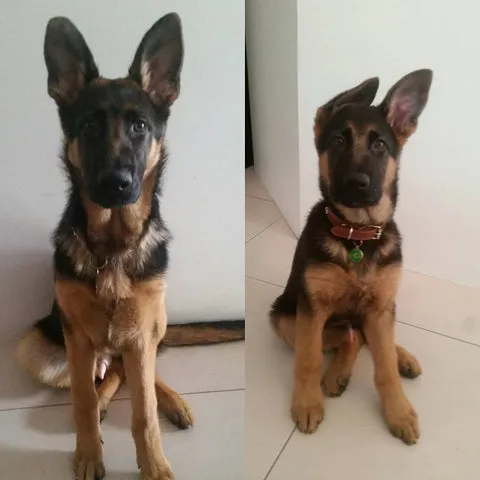 Comparison of a German Shepherd puppy at 12 weeks and 22 weeks old
Comparison of a German Shepherd puppy at 12 weeks and 22 weeks old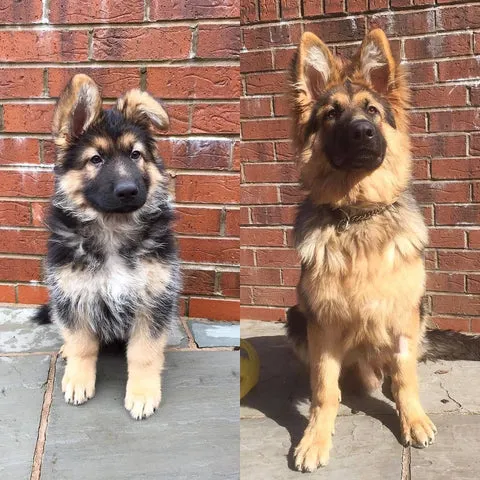 Monty the German Shepherd from a tiny pup to a playful 6-month-old
Monty the German Shepherd from a tiny pup to a playful 6-month-old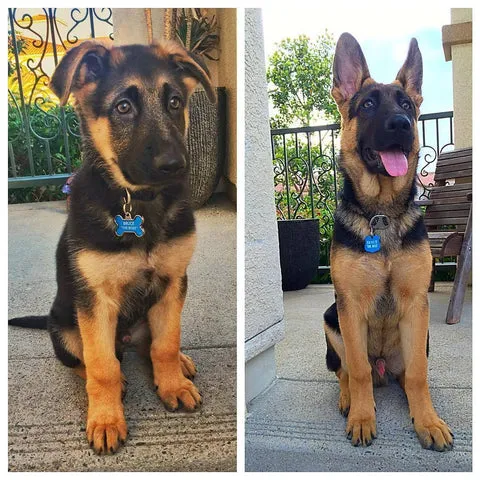 Bruce the German Shepherd puppy at 3 months and his development at 6 months
Bruce the German Shepherd puppy at 3 months and his development at 6 months Adorable German Shepherd puppy Groot at 16 weeks versus his 6-month-old appearance
Adorable German Shepherd puppy Groot at 16 weeks versus his 6-month-old appearance German Shepherd puppy Mookie Pookie at 3 months and the significant change at 9 months
German Shepherd puppy Mookie Pookie at 3 months and the significant change at 9 months Freddie the German Shepherd puppy showing a classic head tilt at 3 months and 6 months
Freddie the German Shepherd puppy showing a classic head tilt at 3 months and 6 months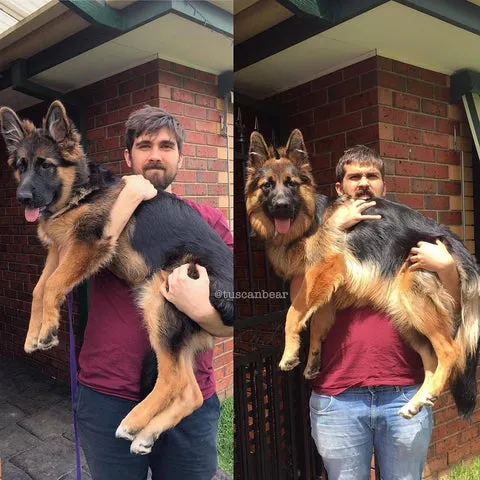 Rapid growth of a German Shepherd from 4 months to 6 months old
Rapid growth of a German Shepherd from 4 months to 6 months old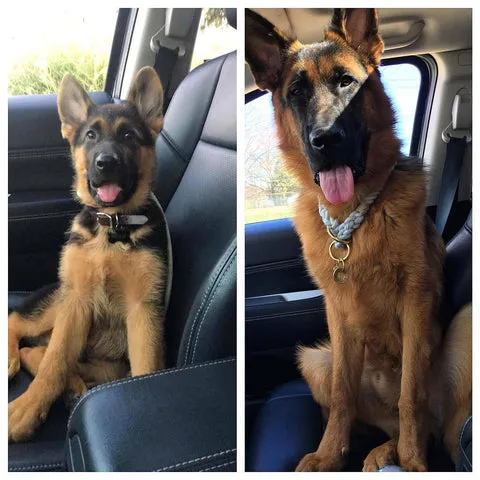 Riggs the German Shepherd puppy at 9 weeks versus his majestic look at 7 months
Riggs the German Shepherd puppy at 9 weeks versus his majestic look at 7 months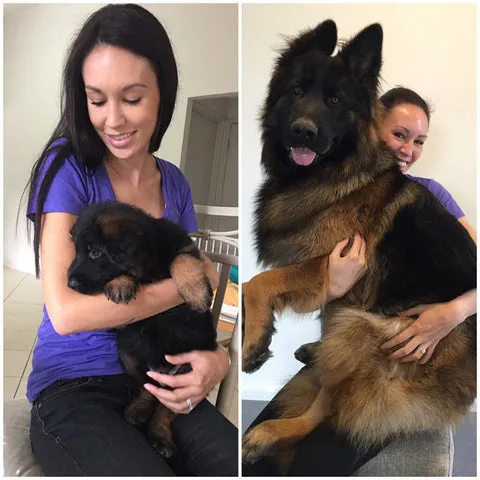 Jesse the German Shepherd puppy at 6 weeks and fully grown at 1 year old
Jesse the German Shepherd puppy at 6 weeks and fully grown at 1 year old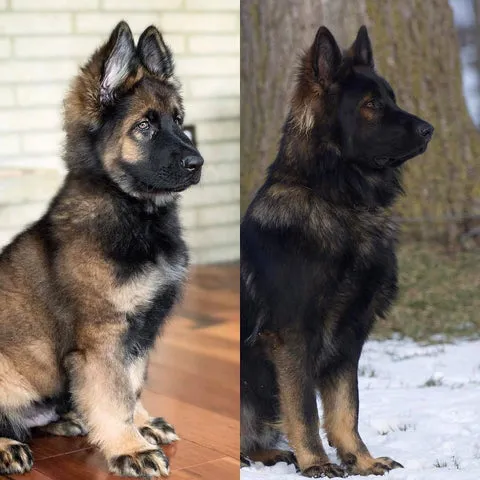 Adorable German Shepherd puppy at 6 weeks compared to the powerful adult at 1 year
Adorable German Shepherd puppy at 6 weeks compared to the powerful adult at 1 year Bear the German Shepherd puppy at 11 weeks and his progression at 20 weeks
Bear the German Shepherd puppy at 11 weeks and his progression at 20 weeks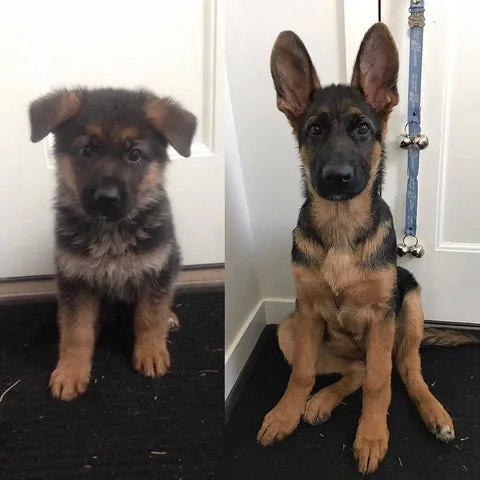 Whiskey the German Shepherd puppy from 7 weeks to 16 weeks old
Whiskey the German Shepherd puppy from 7 weeks to 16 weeks old